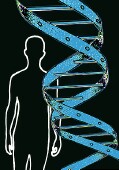
FRIDAY, Oct. 25 (HealthDay News) — Men with certain inherited variations in their Y chromosome may have a higher risk of prostate cancer, according to a large new study.
Researchers from the University of Utah School of Medicine said the identification of these genetic mutations could help scientists develop tests to determine men’s risk for developing the disease and also improve prostate cancer treatments.
In conducting the study, the researchers used the Utah Population Database, which dates back to the 1800s and identifies more than 6.5 million people, spanning 15 generations. The study was narrowed down to 1.25 million men who had at least two parents, four grandparents and six or eight great-grandparents also in the database.
All of the men who did not have a father in the database were labeled as “founders” and assigned a specific Y chromosome identification (YID). Founders’ sons, grandsons and great-grandsons also were assigned the same YID. Of these groups, nearly 260,000 had at least two men sharing the same Y chromosome.
The men’s genealogical and medical records also were linked to the Utah Cancer Registry, enabling the researchers to determine which of the men developed prostate cancer.
The researchers said that since most of the Y chromosome does not recombine during cell division, it is passed almost entirely unchanged from father to son.
“As a result, each male resident of Utah shares the Y chromosome of his father and his father’s father and so on,” study leader Lisa Cannon-Albright said in a news release from the American Society of Human Genetics.
“This provided the ability to estimate the risk for prostate cancer in independent Y chromosomes represented in Utah,” said Cannon-Albright, chief of the genetic epidemiology division at the University of Utah School of Medicine.
Once the researchers estimated the number of prostate cancer cases expected to occur in each YID group, they compared this estimate to the actual number of prostate cancers.
Focusing on 1,000 YID groups that included between about 200 and 2,300 men, the study revealed the prostate cancer incidence was significantly higher than expected in 73 specific Y chromosome groups.
The researchers said that in one YID group of nearly 9,800 men, they predicted that about 45 prostate cancer cases would have occurred. When they compared their estimate to the state’s cancer registry, they found that 65 men in the group had actually been diagnosed with prostate cancer.
A separate group of about 500 men revealed that 26 had prostate cancer. The researchers had estimated, however, that about 10 cases would develop among this group.
Among the men who did not share the Y chromosome of the founder, 39 developed prostate cancer. This rate was not statistically different from the 36 cases of the disease predicted by the researchers, who concluded that there is a Y chromosome-linked risk for prostate cancer that is not seen among men who do not share a common Y chromosome.
The study findings were scheduled for presentation Friday at the American Society of Human Genetics meeting, in Boston. The data and conclusions should be viewed as preliminary until published in a peer-reviewed journal.
More information
The American Cancer Society has more information on risk factors for prostate cancer.
Copyright © 2026 HealthDay. All rights reserved.

